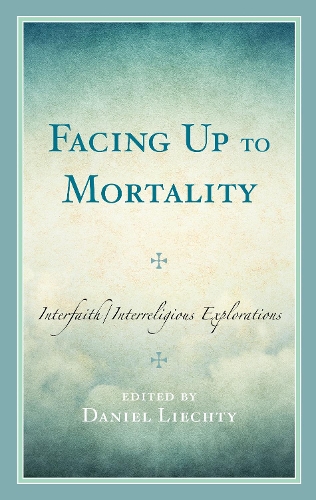
Facing Up to Mortality: Interfaith/Interreligious Explorations
(Hardback)
Publishing Details
Facing Up to Mortality: Interfaith/Interreligious Explorations
By (Author) Daniel Liechty
Foreword by J. Dana Trent
Contributions by Paul Cantz
Contributions by Jonathan Cohen
Contributions by Spee Kosloff
Contributions by Daniel Liechty
Contributions by David R. Loy
Contributions by Anas Malik
Contributions by Merlyn E. Mowrey
Contributions by Anantanand Rambachan
Bloomsbury Publishing PLC
Lexington Books
21st October 2021
United States
Classifications
Professional and Scholarly
Non Fiction
Religion: general
Psychology
Sociology: death and dying
202.3
Physical Properties
Hardback
186
Width 161mm, Height 238mm, Spine 20mm
526g
Description
Exploring a new approach to interfaith/interreligious communication, the contributors to this collection seek to interact from the perspective of their own tradition or academic discipline with Ernest Becker's theory on the relationship between religion, culture and the human awareness of death and mortality. While much interfaith/interreligious dialogue focuses on beliefs and practices, thus delineating areas of disagreement as a starting point, these chapters foster interactive communication rooted in areas of the universal human experience. Thus by demonstration these authors argue for the integrity and efficacy of this approach for pursuing intercultural and interdisciplinary communication.
Reviews
... A rich and timely collection of writings from diverse academics and faith practitioners on that which is shared by all, death. Ever increasing local, national, and global diversity means that we are in regular relationship with those who orient around religion differently than we do. We need leaders, scholars, and practitioners, like those gathered in this text, to navigate this new terrain. Death often heightens the salience of religion, old religious teachings and new questions rise to the surface, making this text all the more valuable. These authors offer a window into the depth of reflection on mortality in the religious traditions they study and practice. In noble pursuit of sharing and understanding, this book may change a reader's understanding of their own tradition or supply them with wisdom to walk alongside someone else in the face of death. A valuable addition to the field of Interfaith Studies, [this collection] will be useful to faculty around the country as they walk diverse classrooms of students through this challenging subject.
--Carolyn Roncolato, Director of Academic Initiatives, Interfaith Youth Core... A terrific collection of chapters delving into how Ernest Becker's theorizing can help us understand the many ways people can and do use religious and spiritual pathways to face up to their mortality. The chapters impressively cover many traditions, including Hindu, Buddhist, Jewish, Christian, Islamic, and pantheistic. We readers come away with a deeper appreciation of the strengths of these diverse perspectives and how we can draw from them to optimize our time on this earth.
--Jeff Greenberg, University of ArizonaAnyone who takes evidence-based practice seriously must confront the idea of mortality salience in terror management theory. Dr. Liechty has done an excellent job curating this insightful and thoughtful volume ... [During this pandemic] death has been on our proverbial doorstep everyday and we can no longer blissfully whistle past the graveyard to ward off our fears. [This collection] will encourage all of us to explore more profoundly our shared humanity regardless of which faith we claim as our own.
--Jim Raines, California State University at Monterey BayErnest Becker and his contemporary colleagues inspired the necessary courage to authentically face the depths of illness, suffering and death. Becker's curiosity and wisdom has led me far beyond the familiar disparaging sense of burn out to a greater sense of what it means to be human.
--Patricia F. Kwok, ARNP, PhD, Oncology nurse, Ernest Becker Foundation board member, and End of Life planning facilitatorThe finest collection I know of that taps the vast and globally relevant interfaith connection to Ernest Becker's legacy. If there is one message that shines throughout this work it is the urgent call for an awe-based religious and spiritual revival, one that fully acknowledges our mortality, our profound vulnerability before cosmic destiny, but also and equally our capacity to participate in that destiny, to cross over into its fathomless mysteries and possibilities for the sake of an enriched and sane life ... a profound and humanitarian resource.
--Kirk Schneider, Ph.D., author of Awakening to Awe, The Polarized Mind, and The Depolarizing of AmericaAuthor Bio
Daniel Liechty is professor of social work and distinguished lecturer in arts and sciences at Illinois State University.
